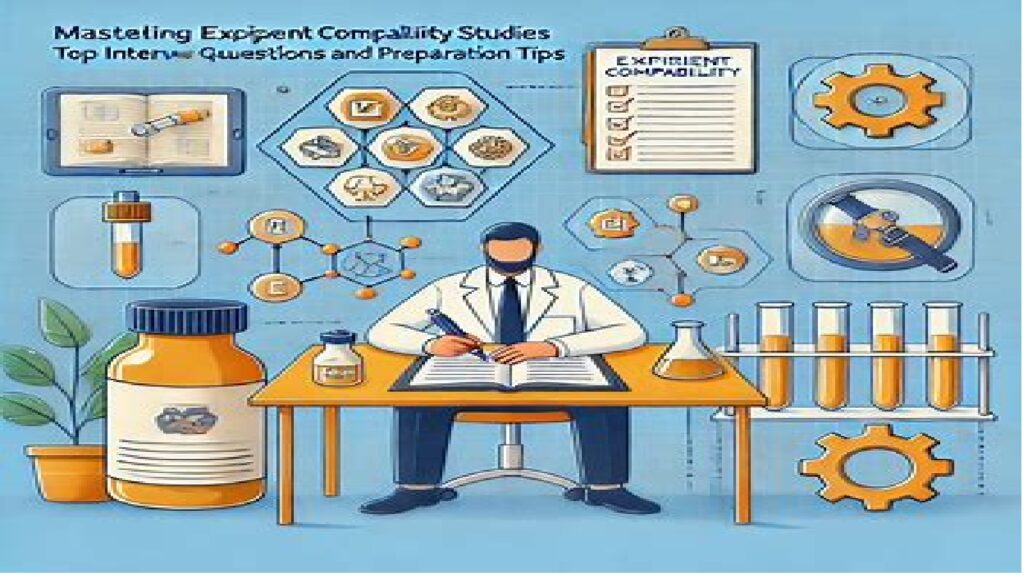Excipient compatibility studies are a critical aspect of pharmaceutical product development. They ensure that the active pharmaceutical ingredient (API) and excipients do not interact adversely, compromising the drug’s safety, efficacy, or stability. This article delves into the key interview questions and tips for excipient compatibility studies, providing valuable insights for job seekers and professionals.
1. Introduction to Excipient Compatibility Studies
1.1 What Are Excipient Compatibility Studies?
- Excipient compatibility studies assess the interaction between active pharmaceutical ingredients (APIs) and excipients. Excipients are inactive substances added to formulations to aid in drug delivery, stability, and manufacturability. These studies ensure that excipients do not negatively impact the API’s efficacy or stability.
1.2 Importance in Drug Development
- Compatibility studies are essential in:
- Preventing undesired reactions between APIs and excipients.
- Enhancing the shelf life of the product.
- Reducing the risk of product recalls or failures during clinical trials.
2. Key Topics for Interview Preparation
2.1 Fundamentals of Excipient Compatibility
- Definition and importance of excipients.
- Common types of excipients and their roles (e.g., fillers, binders, lubricants).
- Basic principles of physical, chemical, and biological compatibility.
2.2 Study Design and Techniques
- Understanding pre-formulation studies and their role in compatibility assessments.
- Knowledge of commonly used analytical techniques:
- Differential Scanning Calorimetry (DSC)
- Thermogravimetric Analysis (TGA)
- High-Performance Liquid Chromatography (HPLC)
- Fourier-Transform Infrared Spectroscopy (FTIR)
2.3 Stability Testing and Forced Degradation Studies
- Steps involved in accelerated stability studies.
- Understanding the concept of forced degradation to identify potential interactions.
2.4 Regulatory Guidelines
- Familiarity with ICH guidelines (e.g., ICH Q8, Q9, Q10).
- Importance of documentation and compliance with regulatory requirements.
3. Common Interview Questions on Excipient Compatibility Studies
a. Fundamental Knowledge Questions
- What is the purpose of excipient compatibility studies in formulation development?
Employers seek to understand your grasp of the study’s significance in ensuring drug stability and efficacy. - What are the key factors to consider when selecting excipients?
Mention factors like functionality, compatibility with the API, regulatory compliance, and cost-effectiveness.
b. Technical Questions
- Describe the methodologies used for excipient compatibility studies.
Discuss common approaches like differential scanning calorimetry (DSC), thermogravimetric analysis (TGA), and Fourier transform infrared spectroscopy (FTIR). - What are the indicators of incompatibility between an API and an excipient?
Highlight changes such as discoloration, precipitation, and altered dissolution rates.
c. Case-Based Questions
- Share an experience where you identified an excipient-API incompatibility. How did you resolve it?
Be prepared to discuss specific cases, the challenges encountered, and how you addressed them. - How would you design a study to evaluate excipient compatibility for a novel formulation?
Emphasize a systematic approach, including pre-formulation studies, analytical techniques, and result interpretation.
d. Regulatory and Documentation Questions
- What are the regulatory guidelines for excipient compatibility studies?
Refer to ICH guidelines, such as ICH Q8 (R2) for pharmaceutical development. - How do you document and report findings from compatibility studies?
Explain the importance of thorough, clear, and accurate documentation for regulatory submissions.
4. Tips for Excipient Compatibility Interviews
a. Deepen Your Knowledge
- Study standard analytical techniques like DSC, TGA, FTIR, and HPLC.
- Understand the physicochemical properties of excipients commonly used in formulations.
b. Showcase Your Problem-Solving Skills
- Share examples of challenges you’ve faced in previous studies and how you overcame them.
- Use the STAR (Situation, Task, Action, Result) method to structure your answers.
c. Be Familiar with Regulatory Guidelines
- Familiarize yourself with ICH, FDA, and EMA guidelines related to excipients and drug formulation.
d. Emphasize Team Collaboration
- Demonstrate your ability to work with cross-functional teams, including analytical scientists, formulation developers, and regulatory experts.
e. Practice Communication Skills
- Be concise and clear when explaining technical concepts.
- Avoid jargon unless it’s clear the interviewer understands it.
5. Key Analytical Techniques for Compatibility Studies
a. Differential Scanning Calorimetry (DSC)
- Measures the thermal behavior of an API-excipient mixture.
- Identifies changes in melting points, which may indicate interactions.
b. Fourier Transform Infrared Spectroscopy (FTIR)
- Detects chemical interactions through shifts in characteristic absorption bands.
c. High-Performance Liquid Chromatography (HPLC)
- Quantifies any degradation products formed due to incompatibility.
d. Thermogravimetric Analysis (TGA)
- Evaluates thermal stability and potential degradation of the mixture.
6. Conclusion
Excipient compatibility studies are foundational to successful drug formulation, ensuring safety, stability, and efficacy. Interviews for roles in this field require a combination of technical expertise, problem-solving ability, and regulatory knowledge. By preparing thoroughly and highlighting your skills and experiences, you can confidently navigate these interviews and excel in this critical area of pharmaceutical development.
With these questions and tips, professionals can better prepare for excipient compatibility study interviews, showcasing their expertise and securing opportunities in pharmaceutical research and development.
For more articles, Kindly Click here.
For pharmaceutical jobs, follow us on LinkedIn
For Editable SOPs in Word format contact us on info@pharmaceuticalcarrier.com
For more information kindly follow us on www.pharmaguidelines.co.uk

